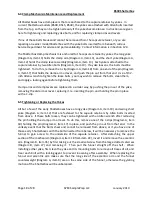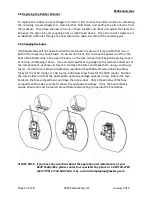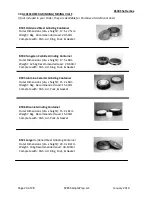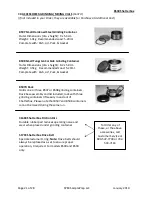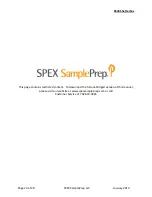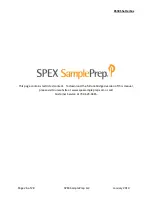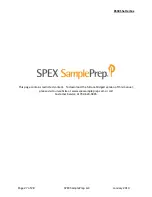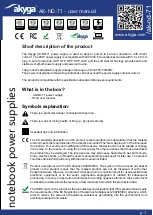
8530 Shatterbox
Page 16 of 28
SPEX SamplePrep LLC January 2010
5.1.4
Emptying and Cleaning the Grinding Container
(Cont’d)
A cleaned grinding container, which will not be used for some time, should be stored in a plastic
bag. Hardened steel grinding containers should always be dried and stored carefully, as they
are prone to surface rusting.
5.1.5
Grinding Hints
It is risky to give exact formulas for sample grinding because there are so many variables. Few
types of sample have the same grinding characteristics. Grinding containers are made of
different materials, all of which grind differently; furthermore, a worn grinding container will be
less efficient than a new one. While there are many analytical techniques that require finely
ground samples, the necessary particle size for proper analytical results may vary from
instrument to instrument and from sample to sample. Consequently these guidelines are
general.
For any grinding container, the smaller the overall sample size, the finer it can be ground in a
given time. Unless a sample cakes during grinding, the longer it is ground, the finer it will get.
Particle size can almost always be lowered further by reducing the sample size or lengthening
the grinding time, or both.
Dry grinding is relatively efficient for most brittle materials, but at small particle sizes (below 50
microns) there is a tendency for particles to stick back together, or "cake." There are many
grinding aids to prevent caking. Water, alcohol, solvents, and other liquids can be added to
create slurries whose mean particle size after grinding can be well below 10 microns, but for
most analytical techniques the liquid must be removed before analysis. Dry grinding aids
include soap powders, detergents, stearates, and aspirin, all added to comprise 1% to 10% of
the total sample weight. SPEX recommends a technique pioneered by Howard Kanare of
Construction Technology Laboratory: ethylene glycol or propylene glycol is added to the
sample in the amount of one drop for every five to ten grams of sample.
In most analytical work it is important to reproduce particle size from sample to sample. Like
other laboratory mills, the Shatterbox requires a fixed routine to accomplish this: a uniform
sample weight, grinding aid, grinding time, container, etc. You are welcome to telephone SPEX
SamplePrep LLC at 1-800 522-7739 or 732-549-7144 to discuss your particular application.
.

















